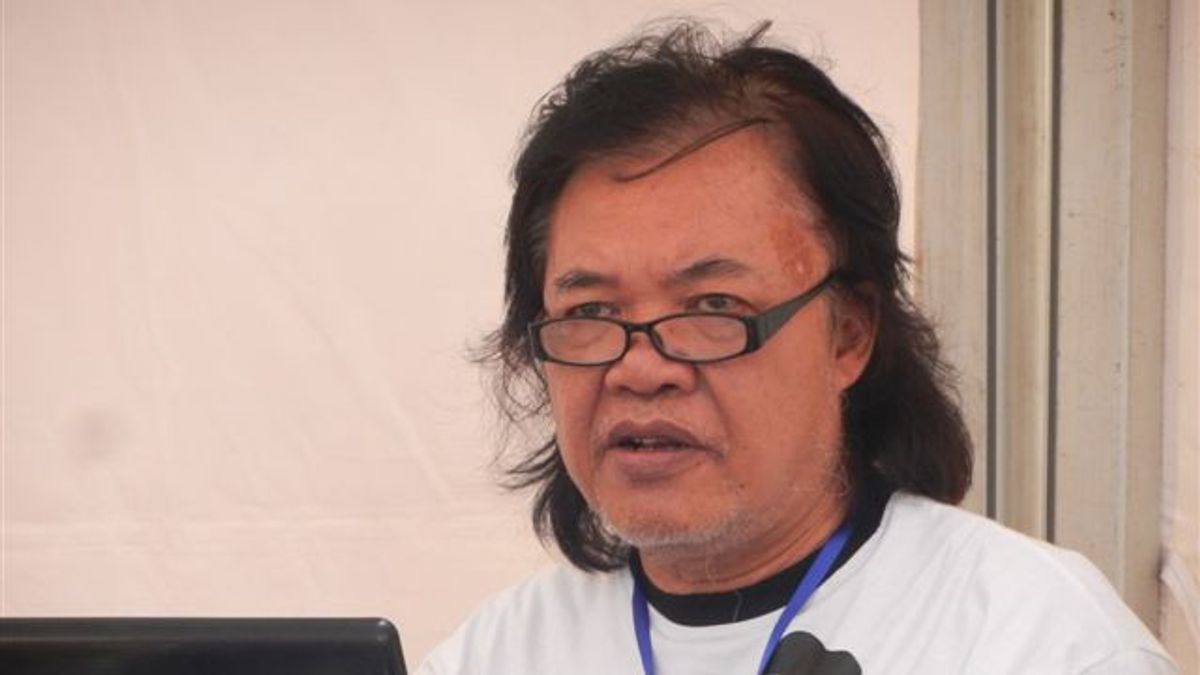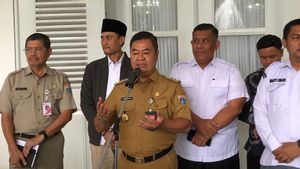JAKARTA - Arswendo Atmowiloto is a versatile writer. Starting from writing short stories, novels, to film scenarios. The filmmaker of Keluarga Cemara, whose name has become more widely known since he stumbled on a case that was deemed to have insulted the Prophet Muhammad because of a poll in the Monitor tabloid he led. Here's his life journey.
Arswendo was born in Surakarta, Central Java, today 26 November 72 years ago or in 1948. He became known since he became an Indonesian writer and journalist who was active in various magazines and newspapers such as Kompas daily and Hai magazine. Arswendo also writes short stories, novels, drama scripts, and film screenplays.
As quoted by the Ministry of Education and Culture's website, Arswendo studied at the Faculty of Language and Literature Education, IKIP Solo but did not graduate. After leaving campus, Arswendo had odd jobs. He has worked with vermicelli factory workers to ball pickers in the field.
It was only in 1971 that Arswendo started his career as a writer. His first short story was entitled "Sleko", which was published in the Weekly Maritime magazine. Apart from being a writer, he is also active as a leader at the Central Java Arts Center's Literary Workshop, Solo (1972).
Arswendo Atmowiloto is a versatile author whose most of his works are novels. The contents of the stories are humorous, fantastical, speculative, and passionate. His work has been published in various mass media, including Kompas, Sinar Harapan, Aktual, and Horison. Among others, his essays were published by Gramedia publisher, Pustaka Utama Grafiti, Ikapi, and PT Temprint. Dozens of his works have been recorded, some of which have been made to television and film screens.
The tabloid Monitor controversyArswendo's name suddenly became a figure because he was persecuted. The case of religious blasphemy like the one that happened to Ahok is not the first time this has happened. In 1990, Arswendo was also imprisoned for insulting the Prophet Muhammad.
His case started with a poll by readers of entertainment tabloid Monitor about his most admired character. As explained by Monique Rijkers in his article published by Deutsche Welle, readers send their answers via postcards and the results are published in the Monitor tabloid, which has a circulation of about 500 thousand copies.
The results of the poll were quite shocking. The questionnaire shows that the Prophet Muhammad was only in 11th place as the most admired figure in Indonesia, behind Arswendo who was in 10th place while President Soeharto was in first place.
This suddenly made Muslims angry because the figure of the Prophet Muhammad was at number 11. The people then criticized the Monitor tabloid. And as Editor in Chief, Arswendo is held responsible for the results of the opinion poll published on October 15, 1990.
The tabloid Monitor published an apology in its subsequent publication but this did not dampen public anger and the judge sentenced Arswendo to five years in prison. He was convicted of being considered subversion and violating Article 156 A of the Criminal Code and Article 157 of the Criminal Code.
Defended by Gus DurApart from demanding Arswendo's imprisonment, angry Muslims at that time also demanded that the Press Issuance Business Permit (SIUPP) of the tabloid Monitor be revoked. At that time, there were almost no figures who defended Arswendo except for the fourth President of the Republic of Indonesia, Abdurrahman Wahid, with Gus Dur's eyebrows. He did not agree that the SIUPP for tabloid Monitor would be revoked and rejected the vigilante action.
"I do not agree with the revocation of any SIUPP. Bring it to court, that is the best solution. Bung Karno in colonial times was punished by the colonial government, but he made a pledoi in Indonesia Suing, and that is the way our nation lives today," said Gus. Dur in Gus Dur's Tabayun (1998).
Thus, Gus Dur appears to be giving lessons to the people to respect the authority of the judiciary and not act as a judgmental person. "I want these Muslims to mature in their own religious views and do constructive things, expand the horizons of the ummah, rebuild the morals of the ummah so that they achieve an optimal balance between emotions and reason," said Gus Dur.
For Gus Dur's defense, Arswendo praised the figure who was considered the guardian. "For me Gus Dur is not a guardian. In fact, even now I believe he is a god, just disguised as a kiai. I can't stop thinking, what's the point in defending me. After all, I don't know Gus Dur very well," said Arswendo at an event in PBNU in 2014.
Behind the prison walls, Arswendo's creativity isn't dead. Instead, he managed to write seven novels, dozens of articles and screenplay scripts.
One of Arswendo's awakening was when he succeeded in making the drama story "Keluarga Cemara" which changed the face of television in Indonesia. The presence of Abah as a pedicab driver, an opak-making mother and her three daughters, presents an educational and entertaining show.
Arswendo died on July 19 at his home in South Jakarta due to prostate cancer. His body is now residing in the cemetery in San Diego Hills, Karawang.
The English, Chinese, Japanese, Arabic, and French versions are automatically generated by the AI. So there may still be inaccuracies in translating, please always see Indonesian as our main language. (system supported by DigitalSiber.id)









